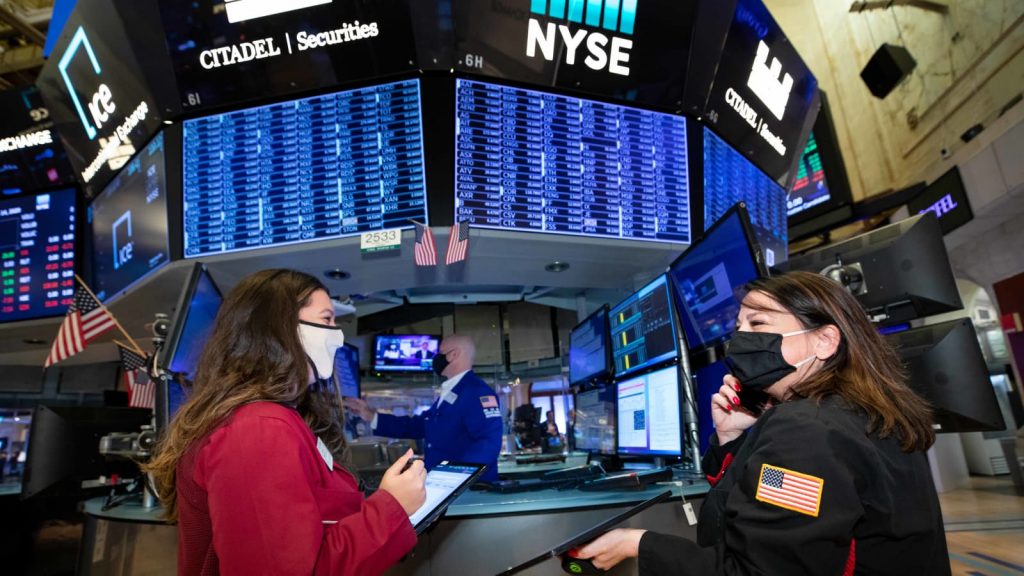
Earnings news from Amazon and Alphabet, the important January jobs report and Washington’s discussion of stimulus could all be important to markets in the week ahead, but none of it is likely to get more attention than the short squeezes driven by retail investors.
Stocks had a rocky week, with the S&P 500 down 3.3% to 3,714. The S&P was down 1.1% for January, its first negative month since October and a warning for the year, according to the old Wall Street adage.
“We were due for some type of decline. We’ve been straight up since October. It’s not unusual that we’re backing off a bit,” said Steve Massocca, managing director at Wedbush Securities.
Trading could remain bumpy in the coming week, as the S&P 500 struggles to hold above 3,716 its 50-day moving average and a key technical level.
“This is the first time we’re at the 50-day moving average since early November,” said Peter Boockvar, chief investment officer at Bleakley Advisory Group. “It’s just a level we haven’t seen in a while and it’s an important first line in the sand of whether the market uses this as a pivot spot to bounce again.”
“The buy the dip mentality doesn’t die easy, but if you break that [50-day], that portends something else,” he said.
Massocca and others see little impact on the broader market from the phenomena of retail investors piling into stocks that are being shorted by big investors. Fueled by no fee trading, retail investors created a flurry of trading in GameStop and other heavily shorted names, like AMC Entertainment. If the stocks rise, in theory, the firms that are short sellers will have to buy stock to cover, and that activity could drive the price even higher in a so-called short squeeze.
GameStop was the poster child for that trade this past week. GameStop shares closed 68% higher on Friday, bringing their gain for the week to 400%. The retailer’s shares hit a high of $483 on Jan. 28.
“This is somewhat isolated,” Massocca said of trading in GameStop and other shorts. He said it may not be a phenomena for that long since there aren’t that many heavily shorted stocks. “I think they may be hunting new names.”
The short squeeze story has garnered broad interest, in the general news media and from Washington.
Lawmakers from both parties are eager to look into the fact that Robinhood and other online brokers restricted trading in the hottest short names when trading was frenzied. Robinhood said it was responding to SEC rules on net capital requirements and clearinghouse deposits that brokers have to comply with.
“This was the busiest week for earnings reported with 82% of the companies reported better than expected earnings. It’s a really good quarter, but obviously overshadowed by the short squeeze news,” said Leo Grohowski, chief investment officer at BNY Mellon Wealth Management.
He said some of the biggest tech names have been lagging, like Apple and Microsoft.
“The combination of demanding valuations and short squeeze news has overshadowed a really good performance of corporate earnings so far,” Grohowski said. “We’re constructive on the market. Fundamentals do look encouraging to us.”
Strategists have expected a pullback in the first part of the year, and many say it would become a buying opportunity. Hedge funds did sell long positions in the past week, but firms like Morgan Stanley and Barclays say the de-leveraging is not likely to have a big impact on stocks.
But for investors who end up buying in at the end of the short squeezes, they could feel some pain.
“I do think this isn’t going to end well,” said Grohowski. “These kind of one way trades they don’t end well particularly for those that come later to the party.”
“I think this will be one of those,” he said. “GameStop is not worth what it is trading for today. I do believe at the end of the day the value of a company is important and it’s going to be driven by fundamentals. These dislocations and distortions of value, they will correct and many will be hurt by that.”
But Grohowski said it’s encouraging that the surge in retail activity was driven by younger investors.
“We’ve wanted for some time for this younger generation to be more interested in the financial markets and equity investing,” he said. “I know a lot of experienced market participants were not anticipating it being this way. It’s not just a one time kind of distortion.
“I think this is thought-provoking in terms of a way a younger generation might be looking at investing, by their rules, not the rules of the traditional market participants,” Grohowski added.
He expects the January employment report to get some attention Friday, and it should be weaker with just 50,000 to 60,000 jobs added.
He said the markets will also monitor the progress of stimulus discussions in Washington, as valuations have risen on expectations of a package coming soon. President Joe Biden has proposed $1.9 trillion in spending, but Republicans are not in agreement.





























